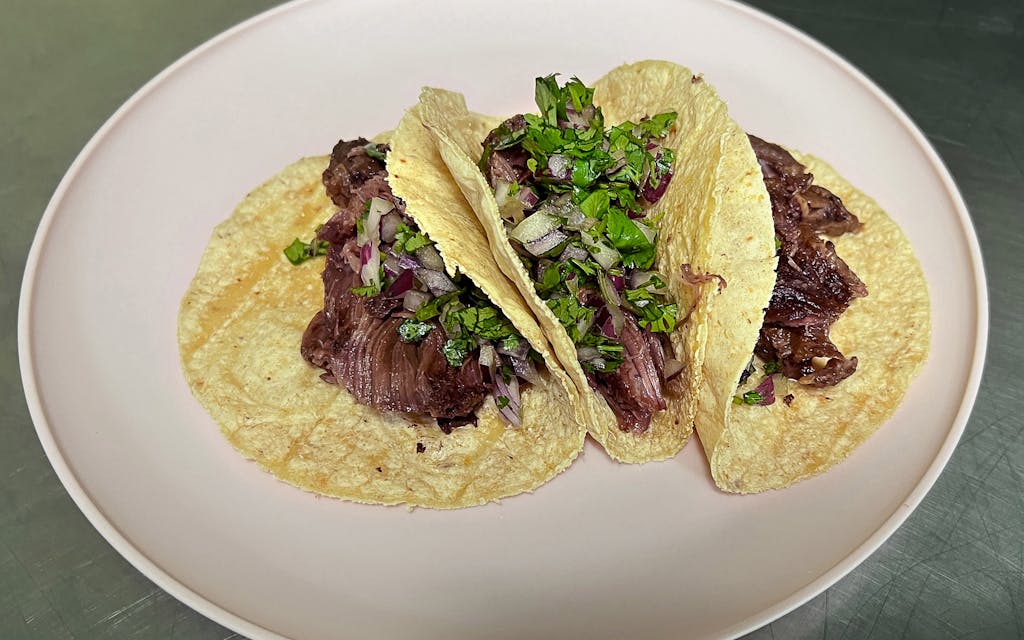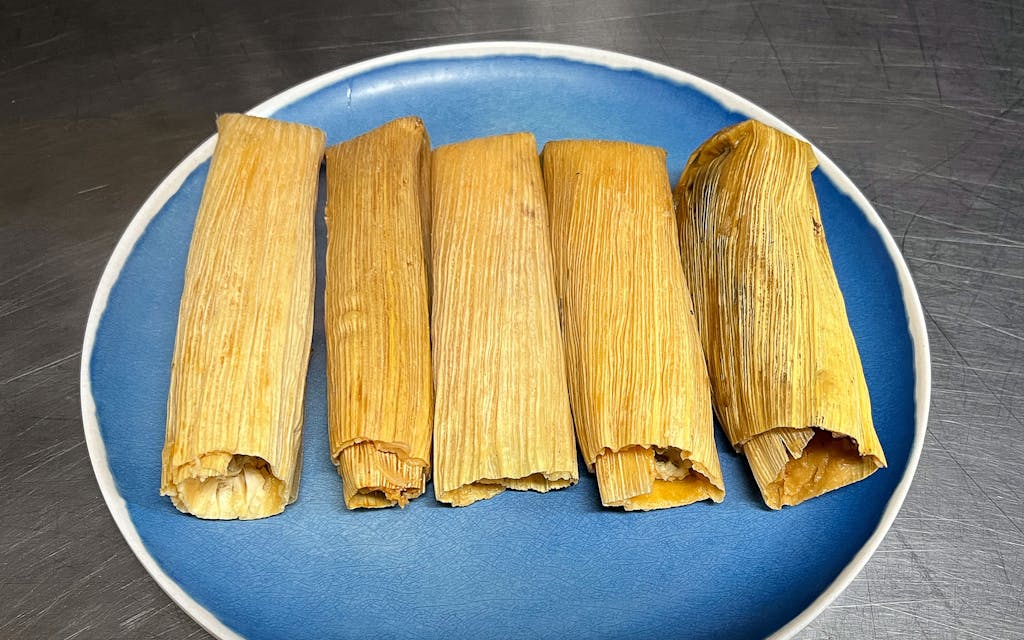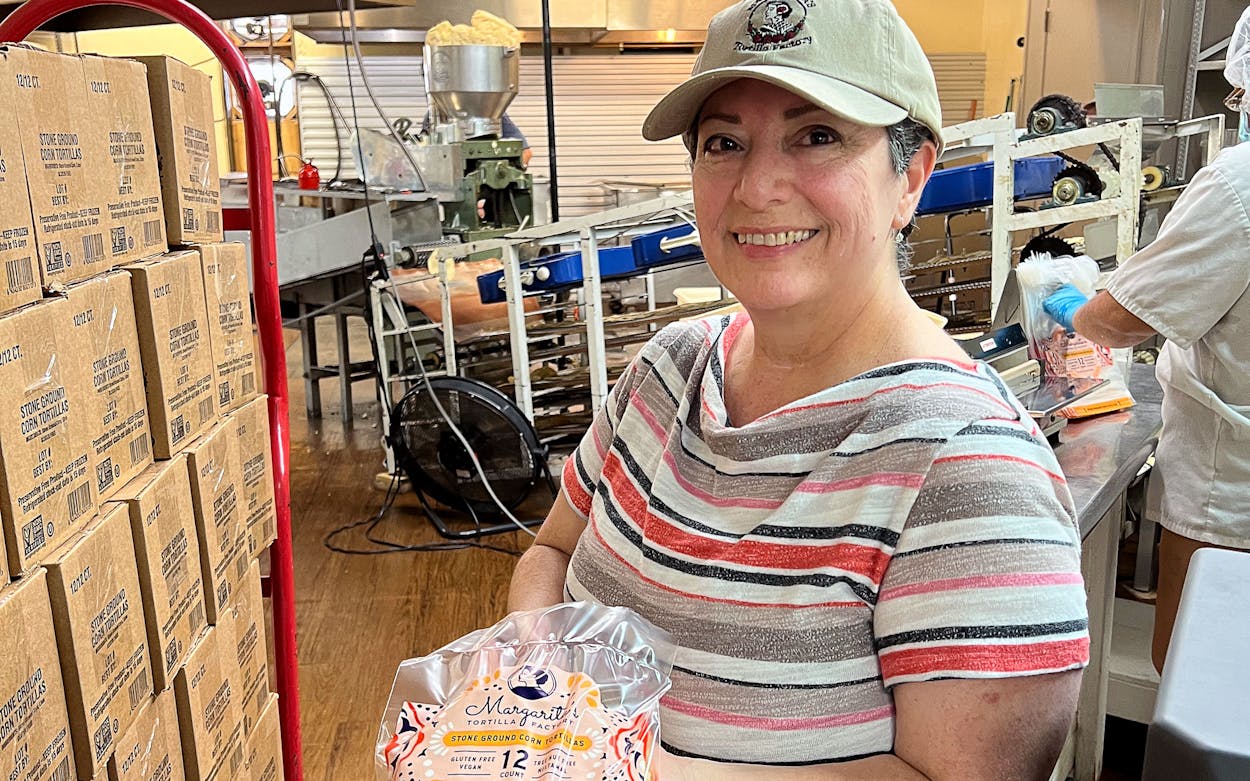Sonia Margarita Vasquez-Grizzle speaks gently. The tenor of her voice belies the grit the 55-year-old owner of Margarita’s Tortilla Factory has employed to overcome myriad obstacles, including a recent bout with cancer. Just like its owner, the San Antonio tortilleria is unassuming. Located in an industrial neighborhood, the small building features corrugated metal siding; inside, a rolling metal table is used as a cashier’s counter. The utilitarian interior also includes a diner-style coffee maker, the menu written on a mirror, and clusters of chairs in the corners. All the frills are overlooked in favor of creating a superior product.
I first encountered that with the smell of corn that permeates the air. Then, I sampled one of the nixtamalized yellow corn tortillas with a smear of butter and a sprinkle of salt and realized it’s damn near to perfection.
“I consider myself a culinary guardian,” Vasquez-Grizzle says. “[Nixtamal] is part of our heritage. Stone-ground corn, there’s nothing like it.” She grew up partially in Río Bravo, in the Mexican border state of Tamaulipas, and started making tortillas at seven years old. That same year, her family moved to Houston, where her father, a mechanic by trade, was working at an oil refinery.
The following summer, the family relocated to Florida to pick tomatoes alongside extended family members. The work was brutal, and Vasquez-Grizzle and her siblings would often cry after a day in the fields. Next, they moved to California to work in more fields. Her parents decided to return to Texas to give the family a better life. Vasquez-Grizzle’s father opened his own auto garage, and her parents were soon able to purchase a house in Harlingen.
While this was a trying period in Vasquez-Grizzle’s life and the family was poor, her parents made sure the kids were always well-dressed and well-fed. “My mom made us all our clothes,” Vasquez-Grizzle recalls. “Even working in the fields, we always had nice clothes.” Vasquez-Grizzle went on to attend the University of Texas at Austin, where she encountered American sour cream and cheddar cheese as common additions to Mexican food for the first time. “We had queso fresco; that’s all I knew,” she says, comparing it to her experience in the Rio Grande Valley. In college, she cooked tortillas and other Mexican foods for friends and roommates. Vasquez-Grizzle went on to graduate with a degree in fashion design and retail merchandising and worked as an interior designer for two years.
When she had children, Vasquez-Grizzle decided to leave her job to stay home and care for her kids. She would drive to the grocery store, craving corn tortillas, and was disappointed by the selection. Longing to reconnect with her culture and food, she was inspired to establish her own tortilleria. Before officially opening, Vasquez-Grizzle took her product to a Whole Foods Market. “I told them I wanted to sell them,” she says. “They tried them and said yes. We’ve been there since day one.” In 1995, with $5,000, she and her husband, David Grizzle, officially opened Margarita’s Tortilla Factory in Manchaca, just south of Austin.

In their one-room factory, they produced 800 tortillas weekly. They slowly increased their business, adding Natural Grocers, Wheatsville Co-op, and independent retailers and restaurants across Texas, Louisiana, Arkansas, and Oklahoma as accounts. Outgrowing the Manchaca space, the business bounced around to a couple other locations before finally settling in the Alamo City—the heart of Texas tortilla production—in 2020.
Just as the couple was readying to open their new space in February 2021, Vasquez-Grizzle discovered a lump in her breast. She hesitated to see a doctor until May, when, she says, she decided to put herself first for the sake of her business and family. A biopsy showed malignant tumors. If Vasquez-Grizzle was stunned by the news, she didn’t show it. She relied on her faith. “I knew everything was going to be fine,” she says. “I was ready [to fight].”
Treatment, which included a bilateral mastectomy and chemotherapy, began immediately. Vasquez-Grizzle worked throughout the course of her care, but that increasingly became more difficult. Radiation combined with brutal Texas summers made conditions unbearable. It’s uncomfortably hot near tortilla production equipment on a normal day, so I can’t imagine how challenging it must’ve been. But Vasquez-Grizzle soldiered on as long as possible until all she could do was rest at home. The hardest part was finding workers to continue operations. Thankfully, her son, Jonathan Grizzle, and his wife, Courtney, temporarily took over her responsibilities.
More than a year later, Vasquez-Grizzle is relieved to be back at work regularly. Courtney remains on staff alongside a small team of non-family members, who Vasquez-Grizzle points out as we’re standing in front of the cashier’s table. David pitches in when needed, including the day I visited. He helped the discs of raw masa move down the belt with a short, narrow dowel and smiled through the hairnet covering his beard. I watched as the cooked corn tortillas inflated, the warmth of life filling them. They were just a few of the 130,000 tortillas Margarita’s Tortilla Factory makes per week. Most of them go on to be sold at retailers, but customers can also come directly to the factory to get their ten-packs of tortillas or a handful of prepared foods such as breakfast tacos, tamales, and barbacoa.
The tamales are made without lard, close to what pre-Columbian indigenous Mesoamericans prepared and consumed. (Lard was introduced by the Spanish.) For Vasquez-Grizzle, the choice to prepare tamales without that ingredient is as much influenced by her upbringing as it is supporting tradition. “My mom was really into healthy food,” she says.

The chicken and cheese tamales are delicate, and the cheese and jalapeño tamales are slightly spicy and fluffy—they’re a gem. Perhaps due to the lack of lard, the tamales aren’t greasy and don’t slide around the corn husk. The San Antonio Tejano friend who accompanied me to the tortilleria said they were the best tamales he’s ever had. They are a fantastic reminder of the variety and history of pre-Hispanic food.
The barbacoa is as distinct as the tamales. The lean but robust beef exhibits keen attention to detail, and the joyful, mouth-puckering flavor evokes the fruits of the family’s labor. Barbacoa—like good tortillas—requires patience and sacrifice. Those are the two things Vasquez-Grizzle excels at, but, of course, she remains humble about that, saying, “It’s just hard work, determination, accountability, and purpose.”
Margarita’s Tortilla Factory
2114 Mannix Drive, San Antonio
Phone: 512-905-2015
Hours: Mon-Fri, 7–3
- More About:
- Tacos
- San Antonio








